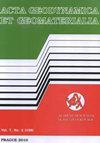浮动、固定和平滑精确点定位的比较和评估
IF 0.8
4区 地球科学
Q4 GEOCHEMISTRY & GEOPHYSICS
引用次数: 6
摘要
精确点定位(PPP)被认为是GNSS数据处理的一种强大方法。重要的输入产品,如精确的卫星轨道和时钟,在国际全球导航卫星系统服务(IGS)内提供,具有足够的质量,可以以厘米级的精度估计接收器坐标。然而,IGS卫星时钟使用户只能将模糊度估计为浮点值。卫星相位偏差的附加乘积对于整数模糊度分辨率(PPP AR)是必要的。另一种方法是利用已经精确和收敛的参数来改进在先前时期估计的那些参数的后向平滑算法。对三种模糊度估计方法的优缺点、坐标精度和灵活性进行了比较和评估。通过处理2018年30天内选定IGS永久站的GNSS数据,以及处理2018年10月25日地震事件期间收集的希腊STRF站的高速率GNSS观测结果,进行了比较。后向平滑改进了浮动解决方案,类似于PPP AR,因此可以被视为一种更容易实现且不依赖于额外卫星的替代方法本文章由计算机程序翻译,如有差异,请以英文原文为准。
Comparison and assessment of float, fixed, and smoothed precise point positioning
Precise Point Positioning (PPP) has been considered a powerful method for GNSS data processing. The essential input products, such as precise satellite orbits and clocks, are provided within the International GNSS Service (IGS) with a sufficient quality for estimating receiver coordinates with centimeter level accuracy. However, the IGS satellite clocks enable users to estimate ambiguities only as float values. An additional product for satellite phase biases is necessary for an integer ambiguity resolution (PPP AR). Another approach is the backward smoothing algorithm utilizing already precise and converged parameters for improving those parameters estimated at previous epochs. All the three approaches for ambiguity estimation are compared and assessed in terms of advantages and disadvantages, achieved coordinates precision, and flexibility. The comparison are performed through a processing of GNSS data from selected IGS permanent stations during 30 days in 2018, and a processing of high rate GNSS observations of the station STRF in Greece collected during the seismic event occurred on October 25, 2018. The backward smoothing improved the float solution similarly like the PPP AR, and therefore can be considered an alternative approach providing easier implementation and no dependency on additional satellites
求助全文
通过发布文献求助,成功后即可免费获取论文全文。
去求助
来源期刊

Acta Geodynamica et Geomaterialia
地学-地球化学与地球物理
CiteScore
2.30
自引率
0.00%
发文量
12
期刊介绍:
Acta geodynamica et geomaterialia (AGG) has been published by the Institute of Rock Structures and Mechanics, Czech Academy of Sciences since 2004, formerly known as Acta Montana published from the beginning of sixties till 2003. Approximately 40 articles per year in four issues are published, covering observations related to central Europe and new theoretical developments and interpretations in these disciplines. It is possible to publish occasionally research articles from other regions of the world, only if they present substantial advance in methodological or theoretical development with worldwide impact. The Board of Editors is international in representation.
 求助内容:
求助内容: 应助结果提醒方式:
应助结果提醒方式:


